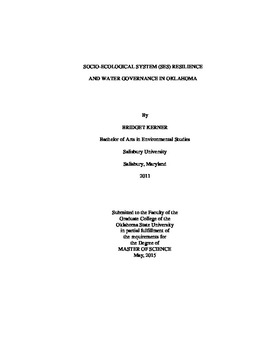| dc.contributor.advisor | Caniglia, Beth Schaefer | |
| dc.contributor.author | Kerner, Bridget Eileen | |
| dc.date.accessioned | 2016-04-15T21:49:25Z | |
| dc.date.available | 2016-04-15T21:49:25Z | |
| dc.date.issued | 2015-05-01 | |
| dc.identifier.uri | https://hdl.handle.net/11244/33426 | |
| dc.description.abstract | This research examines the Socio-Ecological System (SES) resilience of Oklahoma's water governance through an analysis of Oklahoma's state level water policies and Oklahoma's state level water governance network. The research draws from resilience and natural resource governance literatures in order to enhance connections between the literatures. Oklahoma's water governance needs to be resilient because Oklahoma has a history of drought, a limited water supply, a growing population and an economic reliance on agriculture. Additionally, Oklahoma is predicted to experience more extreme climate variability including longer periods of drought and extreme weather events as a result of climate change. Resilience is important for SESs because it helps social and biophysical systems prepare for and adapt to disturbances. Fragmentation within a governance system reduces the resilience and adaptive features within a governance system enhance the resilience of that system. Thus the research questions I address are: What are the implications for resilience of formal natural resource governance at the state level in Oklahoma? Does Oklahoma experience features of fragmentation within its water governance policies? And does Oklahoma experience features of an adaptive water governance network? I use a mixed methods research design involving a content analysis of Oklahoma's water policies and a network analysis of Oklahoma's water governance network to determine how Oklahoma experiences features of fragmented and adaptive governance within its natural resource governance structure. The results reveal that Oklahoma experiences more forms of fragmentation than expected and more features of an adaptive governance network than predicted. Both policy makers and natural resource managers can use the outcomes of this research to prepare for and respond to changes in the availability of water. These preparations can be made by addressing the areas of fragmentation in water policy and the features of an adaptive governance network that Oklahoma's water governance network is currently lacking. Ultimately, this research provides a thorough analysis of the resilience of Oklahoma's water governance and provides implications for the future of Oklahoma's natural resource governance. | |
| dc.format | application/pdf | |
| dc.language | en_US | |
| dc.publisher | Oklahoma State University | |
| dc.rights | Copyright is held by the author who has granted the Oklahoma State University Library the non-exclusive right to share this material in its institutional repository. Contact Digital Library Services at lib-dls@okstate.edu or 405-744-9161 for the permission policy on the use, reproduction or distribution of this material. | |
| dc.title | Socio-ecological System (Ses) Resilience and Water Governance in Oklahoma | |
| dc.type | text | |
| dc.contributor.committeeMember | Mix, Tamara | |
| dc.contributor.committeeMember | Hartshorn, Kelly | |
| osu.filename | Kerner_okstate_0664M_13857.pdf | |
| osu.accesstype | Open Access | |
| dc.description.department | Sociology | |
| dc.type.genre | Thesis | |
